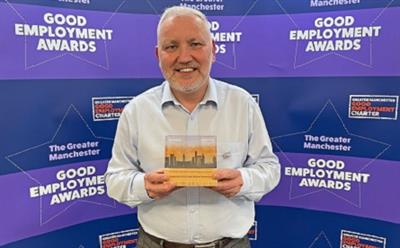A compelling argument from Chris Smallwood of Anchor Removals in Manchester.
 A living wage that meets the needs of everyday life would seem to be the right of everyone in the workplace. But, it seems, it’s not always that way. According to The Living Wage Foundation, around 4.8 million people in the UK alone are paid less.
A living wage that meets the needs of everyday life would seem to be the right of everyone in the workplace. But, it seems, it’s not always that way. According to The Living Wage Foundation, around 4.8 million people in the UK alone are paid less.
By contrast, some 10,000 companies have become Real Living Wage employers, ensuring that all their employees are paid at least an independently agreed hourly rate. One of those companies is Anchor Removals in Manchester run by Chris Smallwood. On 19 May 2022, Chris went along to the House of Commons at the Palace of Westminster to receive an award for being the Greater Manchester Good Employment Charter supporter of the year for SMEs. The charter is an initiative by the Mayor of Greater Manchester, Andy Burnham, who attended the event, hosted by Kevin Hollinrake MP.
At the meeting Chris was asked to explain an employer’s perspective on the Real Living Wage, highlighting why he felt it was not only good for his employees, but good for his business too.
Chris said that his was a small business with just 11 employees operating in an industry that was not traditionally well paid despite being physically demanding, having very unpredictable hours and where challenges are presented that are out of his and his staff’s control. He claimed that very few employers deliver the very basic workers’ rights.
He said he had decided to become a living wage employer in 2016. At the time it was seen as a gamble. “My personal philosophy is and always has been to do the right thing in business,” he said. “At the time, it was an emotional and an ethical decision, but what I didn’t realise is that it was a very sound business decision too.”
He gave some statistics on lost days owing to staff sickness. He said in 2016, before he became a Real Living Wage employer, he lost 131 days with staff taking time off work without a statutory sick note. That dropped to 23 days in 2017, after adopting the new wage policy. In 2020 he lost just one day.
Alone these figures would make a compelling argument for adopting the Real Living Wage, but he added more. He believes that paying people properly encourages loyalty. “This kind of loyalty saves on induction training, mandatory manual handling and fire safety training plus other training over and above the statutory requirements,” Chris explained. “The cost savings on training and the unquantifiable savings on avoiding reputational damage when staff turnover is high are massive.”
He said that the result was “the one dominant requirement for business to survive” – profit. His profit this year is over 8-times higher than it had been in 2016. He clearly believes that his payment policy is a significant contributing factor.
“The truth is that when I get up in the morning and look myself in the mirror, I know that all the comforts that life has brought me through hard work I can enjoy knowing that my staff will not need food banks, will not go hungry and will not suffer at the hands of loan sharks. Their mental health and family lives will be stronger and that makes me feel good. I invite any politician to come to my Salford office and warehouse to see what levelling up really looks like. They will see the respect and pride I have for my team and the respect and pride they have for me. At the very bottom of this is the unshakeable and unbreakable foundation of the Real Living Wage.”
It was a compelling speech and an equally compelling argument, clearly stating the business benefits of paying people properly and respecting their skill and hard work.
Photo: Chris Smallwood received the award for the Greater Manchester Good Employment Charter supporter of the year for SMEs.